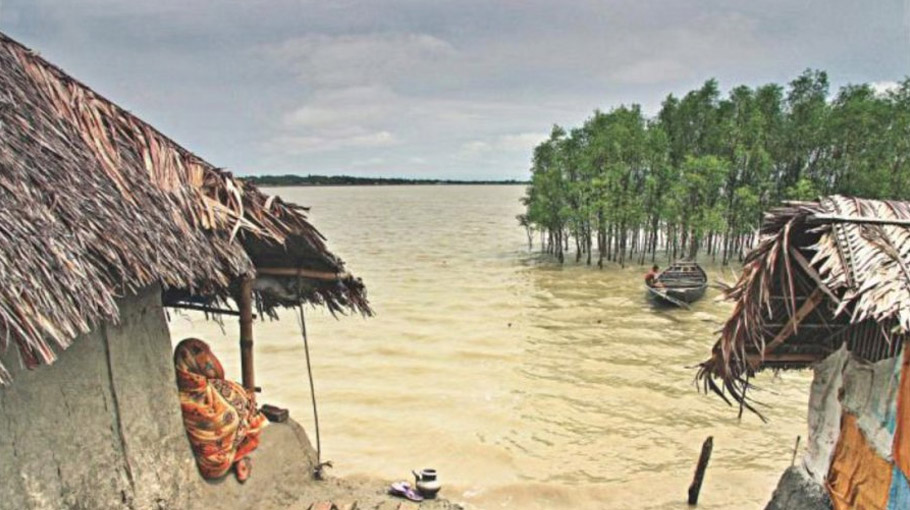51pc climate fund spent on infrastructure dev in 15 yrs

Years of mismanagement and unrealistic decisions in the use of Bangladesh Climate Change Trust funds have led to misuse of the funds to address the country’s climate vulnerability, resulting in a significant gap in expected outcome.
The Bangladesh Climate Change Trust Fund (BCCTF) mainly focuses on spending on infrastructure rather than on combating climate vulnerability. As a result, most of the climate funds are spent on infrastructure development.
After setting up the climate fund in 2009 in order to deal with the damage of climate change in Bangladesh, more than 50 per cent of the climate project funds has been spent on infrastructure development in the last 15 years.
This has resulted in the lack of proper monitoring, unenforceable and fragmented climate policies that encourage corruption despite a law was enacted to manage the climate fund, said experts on climate change.
A study found that 50.89 per cent of BCCTF projects worth Tk. 2095.41 crore have been spent only on infrastructure development during FY 2009-2010 to FY 2022-2023.
The study was carried out to understand whether the BCCTF and National Climate Budget financed projects were approved considering climate change rationale and geographical equity.
The study analysed climate finance flow in drought-prone and Barind areas and made a comparison thereof with that in other stress areas. It also analysed the scenario of climate vulnerabilities of the regions and communities, especially the plain-land indigenous people.
Center for Participatory Research and Development (CPRD), a non-government policy and research-based organisation, with support from HEKS/EPER conducted the study in Dinajpur, Thakurgaon, Kurigram, Chapainawabganj and Naogaon, districts.
Findings of the study were revealed through a study sharing event titled “Distributive Justice in Bangladesh’s Climate Finance: Challenges and Recommendations for Policy Takeaways” held at a hotel in Dhaka city.
The CPRD study analysed 790 BCCTF projects from FY 2008-2009 to FY 2022-2023 and 262 National Climate Budget-funded projects implemented through 25 ministries and their line agencies in the FY 2022-2023.
The study discovered a lack of distributive justice in the BCCTF and National Climate Budget with a dismal scenario of significantly lower financing in the drought-prone and Barind areas compared to other climate-stress areas.
According to the study report, Rajshahi and Rangpur divisions together implemented 143 BCCTF projects, which is half compared to 281 projects in the two coastal divisions. Of the ongoing national climate budget projects, 63 were found under implementation in the drought-prone and Barind areas.
The study also discovered a conspicuous bias of climate financing towards infrastructural development as well as sudden disaster-driven vulnerabilities, with less importance to the sufferers of slow onset events, particularly drought.
On the other hand, BCCTF’s thematic area ‘integrated disaster management’ received only seven projects worth Tk. 32.24 crore, representing 0.89 per cent of the funds.
During the time, the Ministry of Local Government, Rural Development and Co-operatives and its allied agencies, including city corporations, municipalities, Upazila Parishads and Zila Parishads, accessed 479 of BCCTF projects to deal with the climate-sensitive sectors.
The Ministry of Agriculture and the Ministry of Disaster Management and Relief, implemented 23 and 9 projects respectively, representing three and one per cent of the projects.
Among the Bangladesh Climate Change Strategy and Action Plan (BCCSAP) thematic areas, food security, social protection, and health received 42.28 per cent of the National Climate Budget resources in FY 2023-2024, and the thematic area ‘Infrastructure’ is next to it.
Md. Shamsudohha, chief executive of CPRD; explained the study findings and proposed several recommendations. He demands a systemic reform of the ‘Climate Change Trust Act, 2010’ and setting outcome-focused allocation criteria of BCCTF and the National Climate Budget.
He also demands increasing climate budget allocation and ensuring need-based and equitable allocation; development of a separate/standalone adaptation plan for the plainland indigenous communities and inclusion of this in the NAP; a locally-led climate vulnerability analysis’; fostering gender-responsive climate-resilient livelihoods; ensuring climate-sensitive land use planning; capacity building of the local government authorities; and exploring mitigation opportunities aligned with the NDCs.
Dr. Fazle Rabbi Sadeque Ahmed, deputy managing director of Palli Karma-Sahayak Foundation (PKSF); said, “We need to focus on existing resources and practical solutions based on local needs in decision-making.”
He also said that adaptation plans should be designed for vulnerable groups with similar socio-economic backgrounds, ensuring equitable support in the climate stress areas and climate finance must be integrated across sectors to maximize impact.
Corinne Henchoz Pignani, deputy head of mission/head of cooperation at Embassy of Switzerland in Bangladesh was present at the event as a ‘Guest of Honor’. She highlighted that infrastructure is important, but most important is the dimension humanity.
She emphasised in behavioural change, and localised approaches as there is no “one-size-fits-all” solution. True progress in climate action and justice will be achieved when communities own and develop the strategies by incorporating locally led adaptation in the central role. The Embassy of Switzerland’and Swiss NGOs with the help of Bangladesh in making the Bangladesh NAP locally lead.
Dora Chaudhuri, country Director of HEKS/EPER, gave the vote of thanks, highlighting that despite having a rich policy orientation and mechanisms, achieving climate resilience remains elusive due to several procedural and systemic challenges. The ongoing national climate budget allocation needs to be more equitable for the most marginalized and be gender responsive. It fails to address the diverse and complex climate vulnerabilities across locations, she added.




